Stella Moris: my secret family with Julian Assange
Fiancee of WikiLeaks founder reveals how their unlikely romance started inside the Ecuadorian embassy — and how they hid it for years.
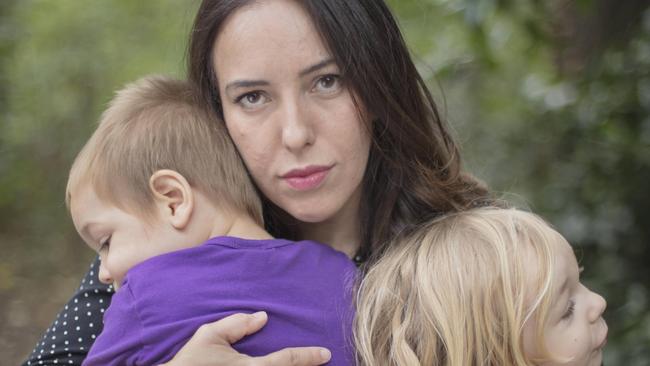
A small blond boy squats by a pond in a London park, eyes fixed on a large fish basking near the edge. His mother stands behind him talking softly on the phone. “It’s Daddy,” she says, pressing the mobile against the three-year-old’s ear. I hear the faint tones of the father’s voice. It’s a scene familiar to any parent trying to talk to a toddler on the phone. But in this case Daddy is locked up in Belmarsh, the maximum-security prison in southeast London.
There is no mistaking the child’s paternity. Daddy is Julian Assange. Three-year-old Gabriel is the spitting image of the WikiLeaks founder, who is currently facing extradition to the United States. Assange faces 17 counts of violating the US Espionage Act for his role in obtaining and publishing secret military and diplomatic documents, and one charge for conspiracy to commit computer intrusion. If convicted on all counts, he could face a sentence of up to 175 years.
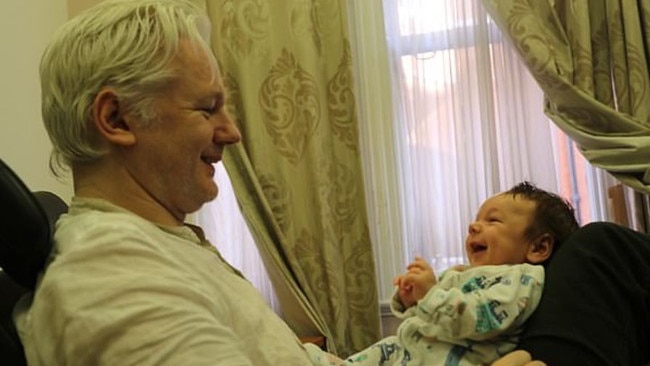
The Australian’s two youngest sons, Gabriel and 19-month-old Max, were conceived in extraordinary circumstances inside the Ecuadorian embassy in London. Their father had sought asylum there in 2012 to avoid extradition to Sweden, where two women had accused him of forcing them to have unprotected sex. Assange denied the allegations and was never charged, but stayed in the embassy for seven years fearing what has now come to pass – that the US would also seek his extradition.
The boys’ mother is a member of Assange’s legal team. Stella Moris is a 37-year-old lawyer who was born in South Africa and holds Spanish and Swedish nationality. She has lived in London for almost 20 years and has one of those mid-Atlantic accents that is hard to pin down. We meet in a park so her sons have somewhere to run around. The children appear happy and are well behaved. Gabriel proudly shows me the dinosaurs on his shirt. Max, who has his mother’s big brown eyes, is more contemplative and loves picture books, including the ones with Australian animals that were sent by Assange’s mother.
The timing of this interview is linked to Assange’s ongoing extradition battle at the Old Bailey. Jennifer Robinson, his lawyer, says Moris has gone “to extraordinary lengths to protect her privacy and that of her children – the fact she is coming forward now and talking in public is a big decision for her”. Assange’s legal team is keen to show that he has a young family who would be deprived of a father if he is sent to prison in the US. He won’t be able to phone Moris and the children every day as he does now, and they won’t be able to visit him.
“For Julian, extradition will be a death sentence,” says Moris. “For the rest of our family it means something not far from it. My children will be fatherless and I will lose the man I love forever. Even now I don’t know whether my children will ever be held in their father’s arms again.”
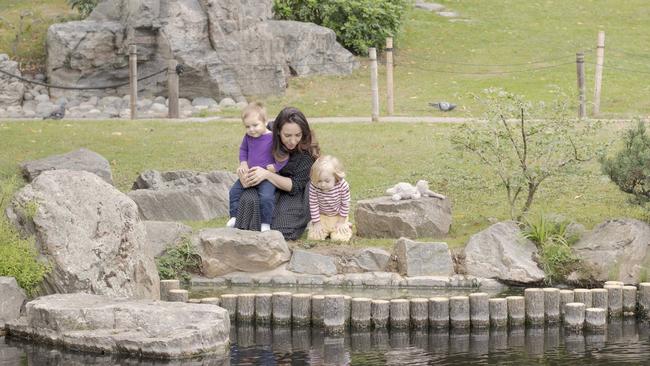
Why would a highly educated lawyer with degrees from Oxford and the School of Oriental and African Studies in London contemplate starting a family with an incarcerated man who may spend the rest of his life behind bars? Surely she must have known that was a risk if they had children together? “Julian and I had known each other for many years,” she says. “We had fallen in love. We had a stable, long-term relationship and we wanted to start a family… It was about taking control. This was one decision that no one could interfere with. It was very elementary.”
Moris points out that people in war zones still fall in love and have children despite everything. She was 33 and in love. She had always wanted children. It was a primal urge regardless of the very strange circumstances. How much privacy did they have in the embassy? “There were security guards there 24/7 and CCTV – but not in Julian’s bedroom or office.” I put it to her that even though there was no CCTV in his bedroom or office, his rooms were almost certainly bugged. “Yes, that’s right. But anything private or secret, I wrote down on a piece of paper. That’s how I told Julian I was pregnant.”
With the hidden microphones, the entourage and the notes, I’m still struggling to understand how any romance could blossom. Her reply is delivered somewhat impatiently: “Well, he was in there for seven years. Because I spoke Spanish, I was in and out of the embassy almost every day, liaising with the Ecuadorians.” She adds: “You get to know a person through adversity and times of crisis – you see their true character. And he got to know mine, because there were some very high-pressure moments.”
Both births were filmed by a close friend. “For Gabriel’s birth Julian watched on a livestream in the embassy. But with Max there were some Wi-Fi issues so he was just on the phone talking to me while I was in labour. I wanted him to see the footage afterwards, but the private security firm in the embassy seized the tape.” The couple went to great lengths to hide both pregnancies so the Ecuadorians wouldn’t use it as a pretext to throw Assange out of the embassy. After Gabriel was born he was carried into the embassy by Stephen Hu, an actor friend of Moris’s, who was posing as his father. Moris would time her arrival afterwards. It was all very cloak and dagger.
By the time Max was born the Ecuadorian government, keen to improve its relationship with the US, wanted Assange out of the embassy and the pressure on him started to increase. During the last months of Moris’s second pregnancy, the couple decided it was no longer safe for her to visit. Stories were leaked about Assange’s increasingly erratic behaviour, including accusations of poor hygiene and riding a skateboard in the embassy.
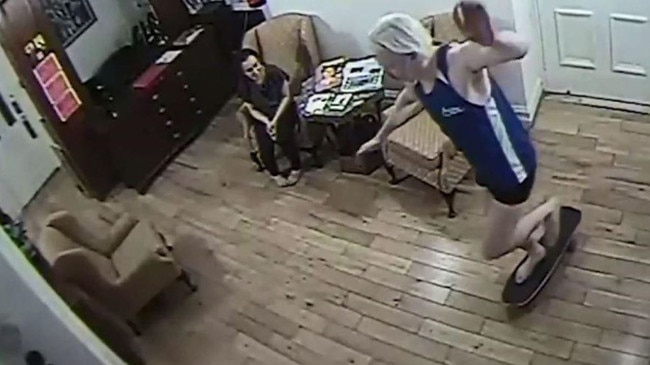
It’s well known that the WikiLeaks founder is paranoid about being spied on, but in this case he almost certainly was. According to evidence given by whistleblowers to the Spanish National Court, a private Spanish security firm, Undercover Global SL, charged with protecting the embassy, started to supply US intelligence with audio and video footage of Assange’s meetings in the embassy, including with his lawyers. One of Gabriel’s nappies was allegedly taken out of the bin and tested for DNA to see if he was Assange’s child.
In April 2019 things came to a head when Ecuador revoked Assange’s asylum. He was dragged out of the embassy by the British police and arrested for violating a bail charge. They served him with the US extradition request the same day, according to his lawyer Robinson, who was with Moris the day of Assange’s arrest. “I got a call telling me to go straight down to Westminster magistrates’ court,” Robinson says. “The media were already there, there were helicopters overhead, it was on the TV. As his lawyer I was able to go down into the cells to see him, but Stella wasn’t – their relationship was still secret. I felt for her because she hadn’t seen him for so long and she’d just given birth.”
The first time Assange met his newborn son was in Belmarsh, but those visits stopped in March 2020 when coronavirus arrived. “For Max,” says Moris, “Daddy is a disembodied voice on the phone.” Video calls are not allowed. Assange has access to a prison landline, but only at certain times and the line cuts out after 10 minutes. Nonetheless he did manage to call Moris three times in the course of the day that I spent with her. (A week after our meeting, Belmarsh permitted Moris and her sons to visit Assange for the first time since lockdown. They were allowed in for 45 minutes, with face masks and visors that were so scratched she could barely see his face.)
The couple have been planning to marry for some time, first in the embassy and then in Belmarsh, but Covid-19 makes that impossible right now. Assange proposed during Moris’s first pregnancy – and he did it in a manner that you may expect from a talented computer coder. “He gave me a VR [virtual reality] headset and told me there was a surprise inside for me. I found myself walking through this virtual world. There was a house and then a beach with balloons and stuff. And then Julian said ‘look up’ and there was this massive ‘Will you marry me?’ written in the sky.”
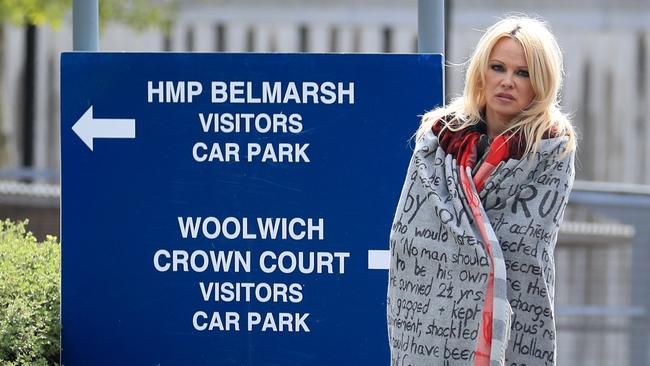
Stella Moris and Julian Assange first met in 2011. Jennifer Robinson had sent an email asking for help on Assange’s Swedish extradition case through the Rhodes scholar network at the University of Oxford. Moris responded. She had a law degree and spoke fluent Swedish, which made her invaluable when it came to fighting the sex assault accusations lodged by two Swedish women. Moris’s first meeting with Assange was at the Frontline Club in Paddington, central London. She arrived expecting to be interviewed but he mistook her at first for a journalist. She describes their first chat as “long and meandering”.
So it wasn’t love at first sight? “No, I found him attractive but I was in professional mode. I wasn’t thinking of him in that way because he was too big a figure. To my mind he was a historical figure.” I’m struck by this description of him being a historical figure. Is it hyperbole? Maybe not. In 2011 WikiLeaks was nominated for the Nobel peace prize after publishing three of the biggest leaks of classified information in history: the Afghan War Diaries, the Iraq War Logs and Cablegate. Assange has won numerous journalism awards, but it is for these very same documents that he now faces extradition to the US.
Was Moris bothered by the sex assault allegations? “Because I speak Swedish I had read the police file before going to meet him. It’s an 80-page document and I followed the reporting in the Swedish media. It was very clear to me that this case had very rapidly become politicised. And there had been very serious procedural violations. They leaked his name to the press immediately, within hours, even though that’s not allowed under Swedish law.”
For the first four years the relationship was purely professional. They didn’t become intimate until 2015. To begin with she was a junior member of the entourage of lawyers, journalists, activists and celebrities that surrounded the WikiLeaks founder. In 2011 Assange was like a rock star at the peak of his celebrity. What did Moris think when she saw images of Pamela Anderson, Lady Gaga or Jemima Goldsmith popping into the embassy and posing for pictures with Assange? She laughs and shrugs her shoulders. “I’d rather have them reporting about Pamela visiting than stories about me being pregnant. And it allowed Pamela to go on TV and she is very articulate.”
What about Assange’s tendency to fall out with people, including close collaborators such as his book publisher and former members of WikiLeaks? Doesn’t she worry that this is a man who has difficulty sustaining relationships? “Julian is wired differently. I think people don’t really understand that his mental make-up is not common… I think of him like a 21st-century Renaissance man. He crosses the scientific and humanities boundaries. He was a talented coder, studied physics and mathematics, but is incredibly well read and he sings really well.” I try to reconcile this with stories of Assange’s narcissism, paranoia and terrible table manners. “The way he’s been written about really stigmatises people who are a little bit different,” she says.
Their relationship didn’t become public until a bail hearing at the end of March. It was two days after Boris Johnson announced lockdown measures in the UK. Moris was terrified that Assange would catch Covid-19 in Belmarsh and made a statement to the court asking for him to live with her and their sons in west London while he awaited the extradition hearing. That request was refused, but the court papers were public so the cat was out of the bag.
In April she spoke publicly about the relationship for the first time. But while the coverage focused on the bizarre conditions in which the couple had started their family, there was almost no information about Moris, apart from that she was a South African-born lawyer who had spent some of her childhood in Sweden and Spain before arriving at the School of Oriental and African Studies in London almost 20 years ago.
Google Stella Moris and you’ll find no mention of her before that bail hearing in March. That’s because she has changed her name – until she became involved with Assange, she was Sara Gonzalez Devant. She looks uncomfortable when I raise the name change and gives a long, slightly garbled answer about surveillance, not trusting the private security firm that was guarding the Ecuadorian embassy, and wanting to protect Assange.
“I didn’t want to change my name… but when I first got involved in Julian’s case I was worried… about people finding me on the internet. I felt that Julian was very politically exposed and that I could become an easy… vulnerability.” Not for the first time in our conversation I’m reminded that Assange inhabits a le Carré-like universe full of secrets, shadows and spies. A world in which you never know quite who to trust.
Moris isn’t the only person around Assange to change her identity. His oldest son Daniel, who was born near Melbourne in 1990 when Assange was 18, reportedly did so after receiving death threats. In 2015 Assange wrote an open letter to the French president stating that another of his children was living in France and the family had been forced to change identity and reduce contact with him because of harassment they’d suffered.
Nobody quite knows how many children Assange has fathered, so I ask Moris whether her boys have met any of their half-siblings. Again there’s a certain reluctance to answer. “Julian is very private when it concerns his family and close friends so he won’t like me talking about this. He wants to protect them. But, yes, his oldest son has met Gabriel. He came to the embassy. It was a very moving moment because he and Julian hadn’t seen each other for a long time and just hugged and hugged. It made me tear up.”
As Moris gets up to leave our interview, I ask whether she is hopeful that the US request for extradition will be refused. “Yes,” she says. “I have the hope that the UK will uphold its own values. And I think one interpretation of Brexit is that there’s a desire for greater UK sovereignty and that means not bending to the will of another state.”
Good luck, I say as she walks out the door, Julian is lucky to have you on his side. “That’s what he says,” she replies.

To join the conversation, please log in. Don't have an account? Register
Join the conversation, you are commenting as Logout